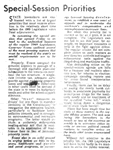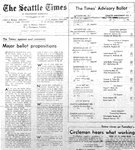The Seattle Times is at it again.
Yesterday morning, the geniuses who publish Washington's "independent, locally owned" newspaper of record
produced another editorial bashing Initiative 1098, which (besides Referendum 52), is the only measure on this year's ballot that would strengthen our state's treasury rather than depleting it.
The Times has been on a crusade against
Initiative 1098 ever since activists, concerned citizens, small businesses, and working families announced last spring that they were teaming up to qualify the measure for the November 2010 ballot. Hardly a month has gone by since when the Times hasn't sneered and jeered at Initiative 1098 or its sponsors.
That includes Initiative 1098's chief proponent, William Gates, Senior, who the Times labels a "salesman". If Gates — a World War II veteran, cofounder of a respected law firm, University of Washington regent, and co-chair of one of the biggest philanthropic organizations in the world (the Bill & Melinda Gates Foundation) — is a no-good "salesman", what does that make the Blethens?
They sell fish-wrappers!
You'd think the Times — which falsely asserts that Initiative 1098 will drive businesses out of Washington — would have more respect for the father of one of the world's most successful capitalists, and a successful capitalist in his own right.
But no. Frank Blethen and Company simply can't stand the idea of strengthening our common wealth. In theory, they want great public services. But when push comes to shove, they are against investing in
anything, whether it's transit, quality public schools, or healthcare coverage for our most vulnerable.
My generation probably can't remember a time when the Seattle Times' editorial page wasn't so
disconnected and unreasonable.
But as it turns out, once upon a time, The Times had a more progressive worldview. Even as recently as the 1990s.
I illustrated this a couple of years ago when I
used the Seattle Times' 1996 editorial in favor of Sound Move (Sound Transit 1) to debunk the Seattle Times' 2008 endorsement against Sound Transit 2. At the time, The Stranger's Dan Savage called the post (which was a joy to write) "
required reading".
Today, NPI is going to take you back in time again, to an even earlier era... an era when the Seattle Times had the wisdom and the courage to recognize that Washington needed an income tax to accomplish the objective of real tax reform.
I hope you enjoy the journey, because putting this post together required many hours of research. Most of the Seattle Times' archives are not freely available (except through a public library), and searching the archive prior to 1990 is difficult. Articles are simply not available in text (ASCII) format.
One quick note before we get started: To put the Times' views of today and yesteryear into starker relief, we will be repeatedly flashing back and forth between now and the years following the presidency of Lyndon B. Johnson (LBJ).
So we'll be examining excerpts from very recent editorials and contrasting them with editorials published in the 1960s and 1970s. (The older editorials are not available for convenient viewing at the Times' website, but you can read them by clicking on the thumbnails to the right of the excerpts).
Let's begin in 1969.
In those days, Dan Evans was governor of Washington State, John Cherberg was lieutenant governor, and progressives could be found in both the Democratic and Republican parties. The state House was controlled by the GOP; the Senate by the Democrats. The Legislature only met in odd-numbered years, and statewide general elections were only held in even-numbered years.
In 1969, the State of Washington was facing many of the same challenges it is grappling with today — which just goes to show what a lousy job we've done of addressing root causes of problems rather than their symptoms.
Governor Dan Evans and the 1969 Legislature decided to tackle what was then and now our state's most difficult challenge: how to fairly and equitably pay for the vital services that Washingtonians rely on.
To avoid any possibility of having the centerpiece of their efforts nixed by the courts (as happened in the 1930s), the Legislature and Governor Evans decided to play it safe by amending the Constitution.
This meant crafting a proposal that would have the support of at least thirty three senators and sixty five representatives, for the Constitution requires a two-thirds vote of each house to put an amendment before the people.
Not surprisingly, the Legislature could not get it done before the regular session ended in March. (Back then, sessions in odd-years only ran for sixty days, which is how long they are now in even years). Consequently, Governor Evans called a special session, so the Legislature could finish its work.
In an editorial on March 16th, 1969, entitled
Special-session priorities, the Seattle Times, then headed by John A. Blethen and W.J. Pennington, opined:
 In convening the special session that opened Friday to attend to the unfinished business of the regular 1969 Legislature, Governor Evans outlined several of the most pressing matters that must be resolved if the state's essential requirements are to be met.
In convening the special session that opened Friday to attend to the unfinished business of the regular 1969 Legislature, Governor Evans outlined several of the most pressing matters that must be resolved if the state's essential requirements are to be met.
Properly, Evans assigned the greatest urgency to passage of a thorough and equitable plan — for submission to the voters — to overhaul the tax structure. A single-rate income tax, adequate safeguards against rocketing property tax and appropriate reductions in other taxes must be devised if the state is to meet its budgetary needs and solve the school support dilemma.
That second paragraph sure sounds like Initiative 1098, doesn't it? An income tax (though levied only on the wealthy), an adequate safeguard against increasing property taxes, and appropriate reductions in other taxes (specifically, the elimination of the business and occupation tax for most small businesses). That is precisely what has been devised and submitted to the voters to help the state meet its budgetary needs and solve the school support dilemma.
Is Initiative 1098 a panacea? Of course not. There is no silver bullet. But it moves us forward. It gets us closer to the objective of real tax reform.
And yet, the Seattle Times of today is against it:
If Bill Gates Sr. and the SEIU push I-1098 past the voters, they will succeed only in bringing California's luck here. And that would be a sad day.
What this state needs is investment in new ideas and new work — and a tax system that smiles upon it.
Notice the bipolarity in those two short paragraphs?
In the same breath, the Times is saying, we can't afford to invest in our vital services, and then implying that we can't afford not to. Huh? How do we invest in "new ideas" and "new work" without a vibrant common wealth?
The Times has already staked out its position against I-1098 in four misleading editorials. There will surely be more, including one actually intended to serve as an endorsement, which will presumably contain the words "vote no" somewhere.
In 1970, however, the Times' ownership had the wisdom and the courage to get behind tax reform. They put their name and their credibility behind that constitutional amendment, which appeared on the ballot a year and a half after it won approval in the state House and Senate.
Here is their endorsement. All emphasis is mine.
 As we view the ballot, House Joint Resolution No. 42 is by far the most important issue to be settled. On its outcome will hinge many things - the quality of our society in respect to the environment, the proper functioning of health and welfare services, the human needs of our state's population, together with the recreational niceties which we hope to enjoy.
As we view the ballot, House Joint Resolution No. 42 is by far the most important issue to be settled. On its outcome will hinge many things - the quality of our society in respect to the environment, the proper functioning of health and welfare services, the human needs of our state's population, together with the recreational niceties which we hope to enjoy.
Baldly stated, this state income-tax proposition poses the question for decision as to whether we as citizens are willing to pay for the kind of society in which we all would like to live. The Times people do not hold an illusion that approval of No. 42 would not, over a period of time, result in a higher level of public expenditures than if it were rejected. A new access to public funds would be opened up for approval.
But we do see valid reasons for opening this revenue source, anyway. Property, sales, business and other excise-taxing sources are bearing too heavy a share of the public-expenditure load. Yet vast amounts of fluid wealth in the form of income escape state taxation. This should begin to bear a fair share of the burden. If H.J.R. 42 is defeated, the additional burden on property and excise tax will become unbearable. For these reasons we recommend approval of No. 42.
Prophetic and wise words from The Times. It's really a shame that readers can't find such insight on the editorial page these days.
Sadly, the people of Washington overwhelmingly voted down House Joint Resolution (HJR) 42; the campaign for passage did not make a convincing case, despite having the weight of a popular governor behind it.
But Dan Evans was determined not to give up. He didn't stop believing that tax reform was important. He resolved, admirably, to use what political capital he had to get the matter back before the people.
I'll continue the story of what happened then in a moment.
But first I'd like to draw another parallel.
By editorializing repeatedly against the measure, resorting to a message built on fear and intimidation, Frank Blethen has made The Seattle Times one of Initiative 1098's most high-profile opponents. If his newspaper's editorials sound desperate, that's undoubtedly because Frank is
feeling desperate. He's already lost one initiative battle over progressive taxation (I-920 four years ago). He does not want to lose another. He is as determined to kill progressive tax reform in Washington as Dan Evans was to achieve it in the 1970s.
So he has run unsigned editorial after unsigned editorial, trashing a a cause that his uncle championed. Initiative 1098 would be a disaster, we're told,
because it robs us of a marketing slogan: No income tax here.
Washington is one of nine states with no tax on wages and salaries. This is a big advantage in recruiting people to work here, and in keeping people from leaving here. When Gov. Chris Gregoire went to the Paris Air Show in her first term to recruit aerospace companies to Washington, the first item of her sales pitch was: no state income tax.
It's a selling point. An asset. And more than that: It's a bonus for living here.
We're also told that I-1098 would be a jobs-killer:
On top of the $808-million-a-year tax increase the Legislature has just imposed on the people — and they have not yet had to pay — the Gates proposal would pile another $1 billion net in new taxes. Adding this weight on the private economy would prevent the creation of thousands of jobs the state desperately needs.
What's missing in these editorials is the admission that without new revenue, state government itself will be forced to shed thousands
more jobs. We know the next Legislature will face a huge budget deficit; the numbers just got worse this morning! I-1098 provides a badly-needed shot in the arm for our public schools and social safety net. It will help keep teachers and case workers employed.
Simply put, I-1098 is a jobs-saver.
By parroting the myth that I-1098 will drive entrepreneurs out of business, the Times is playing the role of a sinister villain, helping right wing millionaires jeopardize our future. They claim tax reform will wreck our state's business climate.
In reality, our state's business climate will be wrecked
without tax reform. What business wants to set up shop in a state where everything is falling apart?
If Frank Blethen really cared our making our public schools the best they can be... if he really believed what his own editorial page prints about the value of a quality education... he'd be for I-1098. But he seems incapable of thinking about the happiness and prosperity of anyone except himself. And his heirs.
Today's Seattle Times suffers from the worst vices of any entrenched institution — chiefly a hostility for imaginative thinking and innovative ideas.
There are very few people that I know who have any respect left for the Times' ownership, let alone editorial content.
Conversely, during Dan Evans' time, Frank Blethen's uncle John — who controlled the newspaper's megaphone — used the editorial page to advocate for progress.
A year and a quarter following the defeat of HJR 42, the Seattle Times published an editorial encouraging Governor Evans and the Legislature to put an income tax back on the ballot. Here is a key excerpt from their January 9th, 1972 editorial, entitled,
The task ahead at Olympia. All emphasis is theirs.
 A new effort in tax reform must be undertaken and submitted to the electorate for approval or disapproval in next November's elections.
A new effort in tax reform must be undertaken and submitted to the electorate for approval or disapproval in next November's elections.
Events now on the horizon leave no doubt but that the state administration and the Legislature will be negligent if they do not permit the voters another opportunity to make a judgment on a state income tax and interrelated fiscal policies.
Fiscally, the state is drifting toward shoals; time is running out for it to continue to fund basic responsibilities in public services with its jerry-built tax structure; nor can the state's businesses and industries develop the immense number of new jobs needed to accommodate the present jobless as well as the younger generation now phasing into the employment market.
It's amazing, isn't it, how much sense is contained in those paragraphs. When I read them I can hardly believe they appeared below the Seattle Times' masthead.
But they did, nearly thirty nine years ago.
Twenty-one months after the above editorial appeared, Governor Dan Evans and the Legislature succeeded in putting an income tax back on the ballot, in the form of House Joint Resolution No. 37.
The measure appeared on the ballot on November 6th, 1973.
The Friday prior, The Times weighed in on the measure, "regretfully" recommending a no vote and concluding that, "the proposition would write into constitutional law innumerable trade-offs by which certain segments in the business-industrial community would be advantaged at the expense of others in the redistribution of the tax burden."
They made plainly clear, however, that they were still proponents of tax reform:
 The Times has been a strong advocate of the principle that a state income tax should be instituted as a means (1) to distribute the tax burden more equitably, (2) to gear public revenues more responsibly to economic growth, (3) to reduce pressures on present tax sources, and (4) to provide education with more dependable revenues.
The Times has been a strong advocate of the principle that a state income tax should be instituted as a means (1) to distribute the tax burden more equitably, (2) to gear public revenues more responsibly to economic growth, (3) to reduce pressures on present tax sources, and (4) to provide education with more dependable revenues.
1973 was before our time, so we do not know what position NPI might have taken on HJR 37. We might have likewise felt there were flaws in the measure, but we might have also felt the amendment was worth approving anyway.
In spite of the efforts of Governor Dan Evans and his chief legislative ally in that campaign — the late Senator Martin Durkan, the father of the U.S. Attorney for Western Washington, Jenny Durkan — HJR 37 went down to defeat.
Evans' popularity was not diminished by the loss, but he never succeeded in convincing voters that an income tax would be a fairer and more equitable way to raise revenue for our common wealth.
Which brings us to today.
The days when the Seattle Times could be counted upon to dissect and examine the issues in good faith are long gone. But the wisdom contained in The Times' past editorials is still with us. I've resurrected them because the team at NPI believes they add to the debate about Initiative 1098, and disprove the contention that the Seattle Times has always been as stodgy as it is today.
I urge you to forward this post to your friends, family, and neighbors, so that they can study the history of this issue and learn something before they vote.
We have an opportunity in a few weeks to take an important first step towards a fairer and more equitable tax system. Previous generations squandered such opportunities, and we are paying the price. We can do ourselves and our children a favor by resolving not to make the same mistake. On or before November 2nd, help bring real tax reform to Washington: Vote
YES on Initiative 1098.





